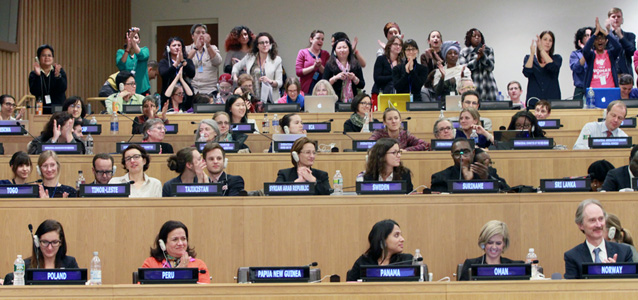From March 10th to 21st, DSW participated in this year’s session of the UN Commission on the Status of Women (CSW) as part of the German government delegation. This year, the CSW focused on the challenges and achievements in the implementation of the Millennium Development Goals for women and girls and how to integrate the lessons learned into the next development framework.
In (in)tense negotiations, sometimes until the early morning hours, an outcome document was negotiated, the so-called agreed conclusions. The document and the negotiations around it covered many issues which are more controversial than most of us imagine: the human rights of women and girls, the access of adolescents to comprehensive sexuality education and contraceptives, the concept of “the family” versus “different forms of families”, the rights of sexual minorities, development financing, climate change, and trade related issues.
In the end, the CSW made a strong call to prioritize gender equality and the human rights of women and girls in order to achieve sustainable development. The agreed conclusions include a call for a stand-alone goal on gender equality in the post-2015 agenda as well as for gender-specific targets across all other development goals—especially those related to education, health, economic justice, and the environment. The commission also called on governments to address the discriminatory social norms and practices that foster gender inequality, including early and forced marriage and other forms of violence against women and girls, and to strengthen accountability mechanisms for women’s and girls’ human rights.
The outcome was applauded by women’s rights activists who worked many hours to push for these issues in formal and informal conversations with governments. Professor Gita Sen from India, member of the High Level Task Force for the ICPD, for example, made a strong intervention on why progress on the implementation of the MDGs has been especially slow for women and girls at one of the round tables of the conference. Several civil society representatives, e.g. the Youth Caucus, gave oral statements in the official meetings of the CSW. In more informal settings, CSOs and governments exchanged their views on how to improve the documents in order to advance the women’s rights agenda, for example regarding sexual and reproductive health and rights. If you want to get a sense of the atmosphere in the hallways of the UN during these conversations, this ABC of CSW is a good read.
In addition to the main agreed conclusions, several topic specific agreed conclusions were negotiated. The one on Women, the girl child and HIV and AIDS was highly contentious until the very last moment of the conference and had to be voted on in the end. Again, the controversy was mainly about how to prevent HIV infections: through evidence based comprehensive sexuality education or through the promotion of abstinence, fidelity, delay of sexual debut and the reduction of sexual partners. In the end, language around the former concept was voted into the document while supporters of the latter including the South African Development Community, the Holy See, Qatar, Iran and Russia lost this attempt of watering down language that had formerly been agreed at international conferences.
For pictures see: https://www.flickr.com/photos/unwomen/sets/72157642209057165/
All photos: UN Women/Ryan Brown


